Eskrima Stickfighting

Trailer
Recently Updated Shows

The Savant
You've never heard of her, but somewhere in America, a top secret investigator known as the Savant is infiltrating online hate groups to take down the most violent men in the country.

MasterChef Australia
MasterChef Australia is an Australian competitive cooking game show consisting of a group of hopeful contestants that cook and present food to judges in order to win the title of MasterChef Australia.

Big Brother
Big Brother follows a group of people living together in a house outfitted with dozens of high-definition cameras and microphones recording their every move, 24 hours a day. Each week, the Houseguests will vote someone out of the house. At the end, the last remaining Houseguest will receive the grand prize of $500,000.

Who Wants to Be a Millionaire
In Who Wants to Be a Millionaire, 15 questions need to be answered by the contestants to win the 1 million dollar prize.

MasterChef
Three celebrated food experts put the latest group of contestants through a series of challenging elimination rounds and turn one home cook into a culinary master.